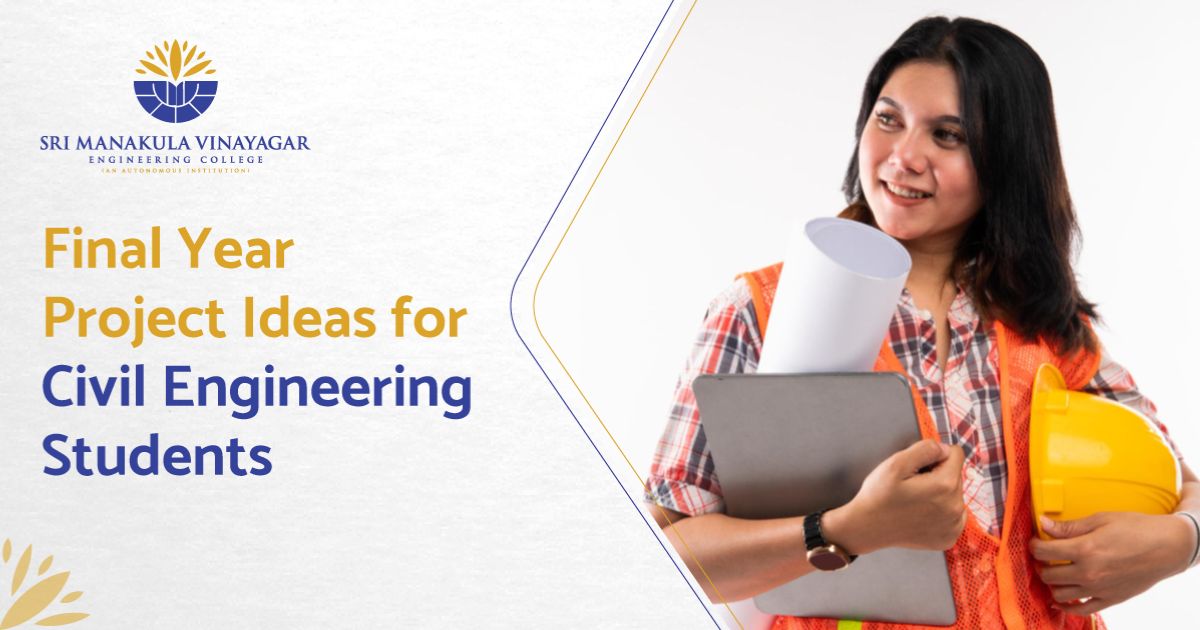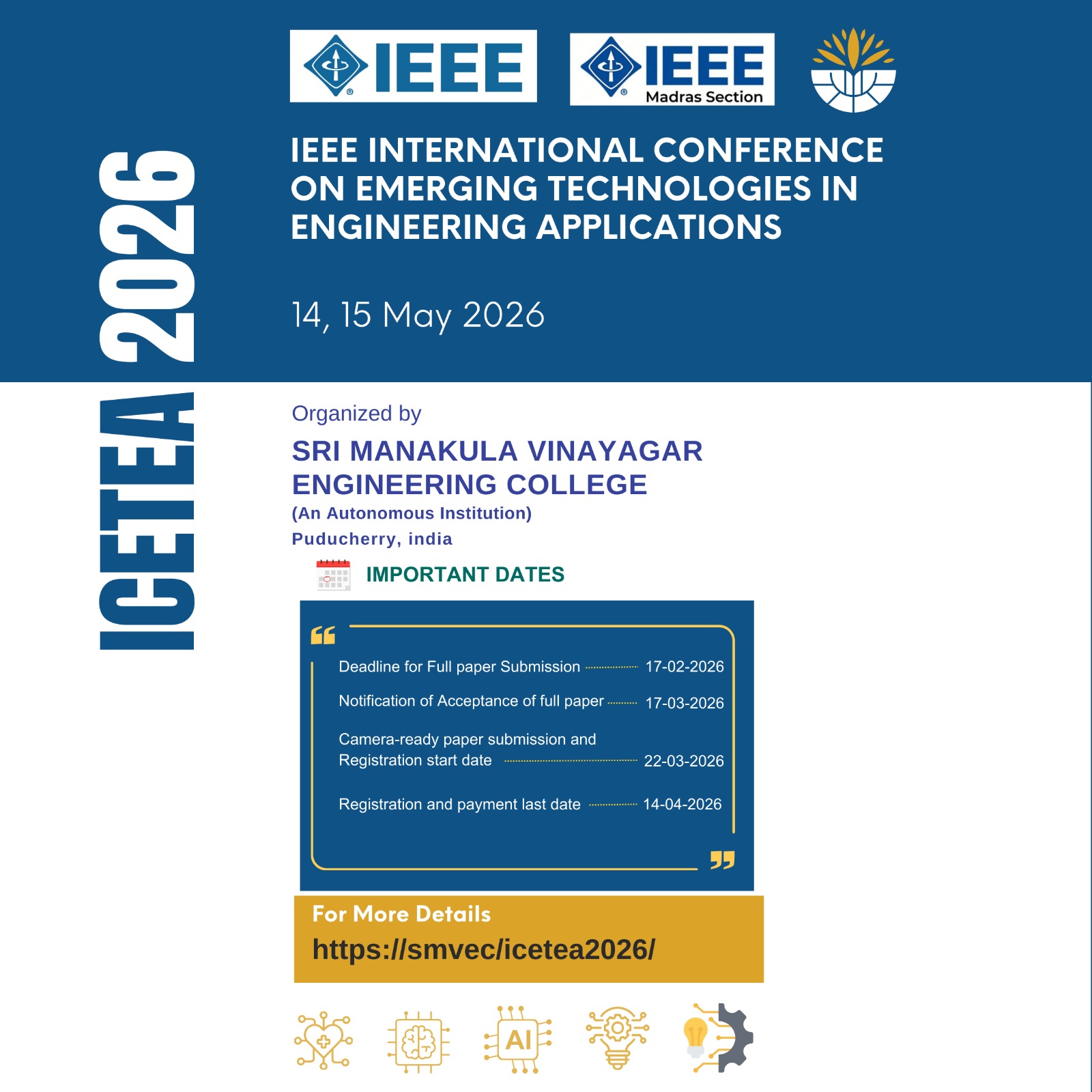The final year of an engineering project is a crucial stage where students can turn their ideas into real-time projects based on their academic knowledge and skills. For civil engineering students, final-year projects are the backbone of their educational journey and prepare them for the real-time work environment.
Through this practice, students will learn concepts and work on stable construction design structures that can be built strong in any area or natural disaster.
Introduction
Civil engineering is more than constructing buildings, bridges, dams, or highway roads; it’s about designing sustainable structures that meet society’s needs. Final-year projects are a platform for students to demonstrate their engineering concepts, creativity, analytical approach, and design thinking.
This blog outlines Final-Year Project Ideas for Civil Engineering Students, helping them guide their academic learnings into the best possible career.
10 Final Year Project Ideas for Civil Engineering Students
1. Smart Traffic Management System
- Overview: Develop an IoT system to optimise traffic flow and reduce urban overcrowding areas or places.
- Skills Applied: Core concepts of traffic analysis, data analytics, and intelligent infrastructure.
- Relevance: This solution addresses urban mobility challenges, an essential need in India’s growing cities, such as Chennai, Surat, Bangalore, Hyderabad, Mumbai, and Patna.
2. Green Building Design and Construction
- Overview: Create an energy-efficient building design containing sustainable materials and renewable energy.
- Skills Applied: Environmental engineering, material science, and renewable energy integration.
- Relevance: Supports society in pushing for sustainability and reduced carbon footprint.
| Did you know? Government Initiatives in India: The Smart Cities Mission has created huge job opportunities for students to base their projects on real-world problems like traffic congestion, waste management, and sustainable urban planning. 90% of Civil Engineering Students: According to global surveys, most civil engineering graduates meets that their final year projects were vital in shaping their technical and analytical skills. |
3. Water Resource Management in Developed Areas
- Overview: Proper design systems that prove efficient rainwater harvesting and wastewater recycling. These concepts improve water management by using these few tips.
- Skills Applied: Hydrology, fluid mechanics, and metropolitan cities.
- Relevance: Analyses the severity and priority of water lack in rural and urban cities.
4. Earthquake-Resistant Building Models
- Overview: Research and Develop structural models capable of withstanding natural disaster activities.
- Skills Applied: Fundamental concepts of structural dynamics, material analysis, and disaster management.
- Relevance: Some of the most affected areas/regions, such as Gujarat, Nagaland, and Mizoram, suffered heavily from earthquakes in Indian states.
5. Road Construction Techniques
- Overview: Analyze innovative methods and techniques using today’s tech software and, based on that, develop a small look-alike model. Use techniques for constructing long-lasting, eco-friendly roads using recycled materials and components.
- Skills Applied: Transportation engineering, geotechnical studies, and fundamental core principles.
- Relevance: Meets with government initiatives for green infrastructure to benefit society.
6. Flood Protection Planning
- Overview: Research more about flood rescue construction methods. Based on that, design and implement flood control measures for remote areas/ regions.
- Skills Applied: From core principles of hydrodynamics, GIS mapping, and disaster protection management.
- Relevance: Some required regions for states like Tamil Nadu are frequently affected by floods.
7. Smart Cities Projects: Integrates Technology in Urban Planning
- Overview: Create a well-researched blueprint for smart city project development using advanced tech solutions tools like AI, 3D designs, Visual graphics, etc. Using these modern tech tools, you can easily preview the outcomes of your projects.
- Skills Applied: Urban design, AI, IoT, and automation.
- Relevance: Suits with India’s Smart City Mission.
8. Bridge Development Monitoring Strategy
- Overview: Develop a plan to monitor the structural integrity of bridges using sensors and AI.
- Skills Applied: Structural engineering, AI, and sensor technology.
- Relevance: Secures infrastructure safety and long-term.
9. Soil Stabilisation Techniques for Construction Projects
- Overview: Research makes a unique method to stabilise soil for construction segments.
- Skills Applied: Geotechnical engineering and material science.
- Relevance: Key for areas or typical rural villages with unstable soil conditions.
10. Urban Waste Management Solutions
- Overview: Design techniques for efficient waste segregation, collection, and recycling in high-tech cities.
- Skills Applied: Environmental engineering, waste management, and logistics.
- Relevance: This project mainly supports the Swachh Bharat Mission for clean cities.
What is Civil Engineering?
The recent Indian national economic reports mentioned that the future of India also depends on civil engineers. They are the creator of New India.
Civil engineering is one of the branches of engineering that focuses on the design, construction, and maintenance of the built environment. This includes buildings, bridges, roads, dams, tunnels, airports, and other structures crucial for public use and welfare.
Civil engineers apply principles from various fields, including mathematics, physics, and materials science, to create structures and systems that meet societal needs and enhance the quality of society’s life standards.
Major subjects for Civil Engineering
- Fluid Mechanics
- Concrete Technology
- Environmental Engineering
- Building Planning (Urban / Town Planning)
- Building Materials
- Design of reinforced concrete structures
- Earthquake Engineering
Key Areas of Civil Engineering
- Structural Engineering: This area of specialisation deals with the design and analysis of structures that support or withstand loads, whether strong, safe, or stable.
- Geotechnical Engineering: This part focuses on the substance of soil and rock and their interaction with structures. This includes foundation design, earthworks, and slope stability. Based on that, the construction works are finalised.
- Transportation Engineering: It involves a mini prototype, planning, designing, and building transportation techniques, including roads, highways, railways, ports, and airports, to promote efficient movement.
- Water Resources Engineering: It is majorly concerned with managing water resources, including water supply, irrigation, flood control, and wastewater treatment.
- Environmental Engineering: Purposes to improve and protect the environment through sustainable practices and technologies, managing pollution control, waste management, and resource conservation.
- Construction Engineering is concerned with managing and executing construction site projects and ensuring they are completed safely, on time, monitored by the field engineers, and within budget.
- Urban Planning focuses on developing and designing urban areas, integrating land use planning, zoning, and community development to create sustainable, modern cities.
Tricks to find the best project topics
- Choose the topics/projects that are in demand in current scenarios.
- Choose something other than existing project concepts. Try to understand your strong core principles.
- Research lots about recent development scheme projects for rural and urban areas, case studies, or technical documentation
- Try to choose your domain-related projects 70 to 80%. Remaining you prefer other streams.
- Make sure that your topics/projects are easy to understand for everyone. Based on your model view.
Betterment for society
- Apart from contributing to professional goals, this area guides civil engineers and contributes to the betterment of society. The first priority is safety, and civil engineers work on designing safe structures and materials on many levels. They also need to be protected from severe climates and natural disasters.
- Civil engineers also have the responsibility of creating sustainable and environmentally friendly options. They need to figure out how to cut pollution and build zero-carbon structures in the modern era of climate change. Modern infrastructure must be able to withstand frequent repairs and renovations to remain functional over time.
Your Project, Your Contribution to the World: Guidance from SMVEC
SMVEC means where innovation meets our excellence; it’s not just a word. We prove our skilled student’s achievements in several domains. Our academic training upgrades students to give tough competition among others by creating innovative and impactful final-year projects.
Here’s how we support our students:
- World-class advanced Labs: Best and clean, well-maintained facilities for research and experimentation works
- Industry Connection: Associations with leading MNCs for project sponsorships, government schemes, and work environment.
- Mentorship: Skilled faculty members guide students through the project lifecycle.
- Workshops and Seminars: Regular events like department-wise workshops, conferences, or reports submitted to improve technical skills and introduce new trends and technologies.
- Financial supports: For high-potential projects that explain critical and society-related issues.
Conclusion
Choosing a final-year project can be vital for civil engineering students, but it is also an opportunity to study personal interests and develop practical skills. The Final-Year Project Ideas for Civil Engineering Students drafted in this blog address current trends, technological advancements, and demanding challenges in civil engineering.
Projects such as developing sustainable housing solutions, designing smart traffic management systems, or analysing earthquake-resistant structures with the help of academic learning contribute to real-world scenarios.
As students report on their final projects, they should consider their passions, career involvement, and the potential impact of their work on society and the environment.
Also, get frequent updates from the SMVEC Instagram page
FAQs – 10 Final Year Project Ideas for Civil Engineering Students
1. Why are final-year projects important for civil engineering students?
Final year projects replicate technical terms, creativity, and problem-solving skills, preparing students for industry work.
2. How does SMVEC assist students in their final year projects?
SMVEC offers advanced labs, mentorship, industry connections, and financial support for unique projects that helps society development
3. What are some high-impact civil engineering project ideas?
Ideas include smart traffic systems, green building designs, water management, and earthquake-resistant construction.
4. Can students collaborate with industries for projects?
Yes, SMVEC has industry partnerships that develop students to work on real-world problems with professional guidance.
5. Is there financial support for final year projects?
SMVEC provides funding for innovative and high-potential projects addressing rural problems and challenges.




